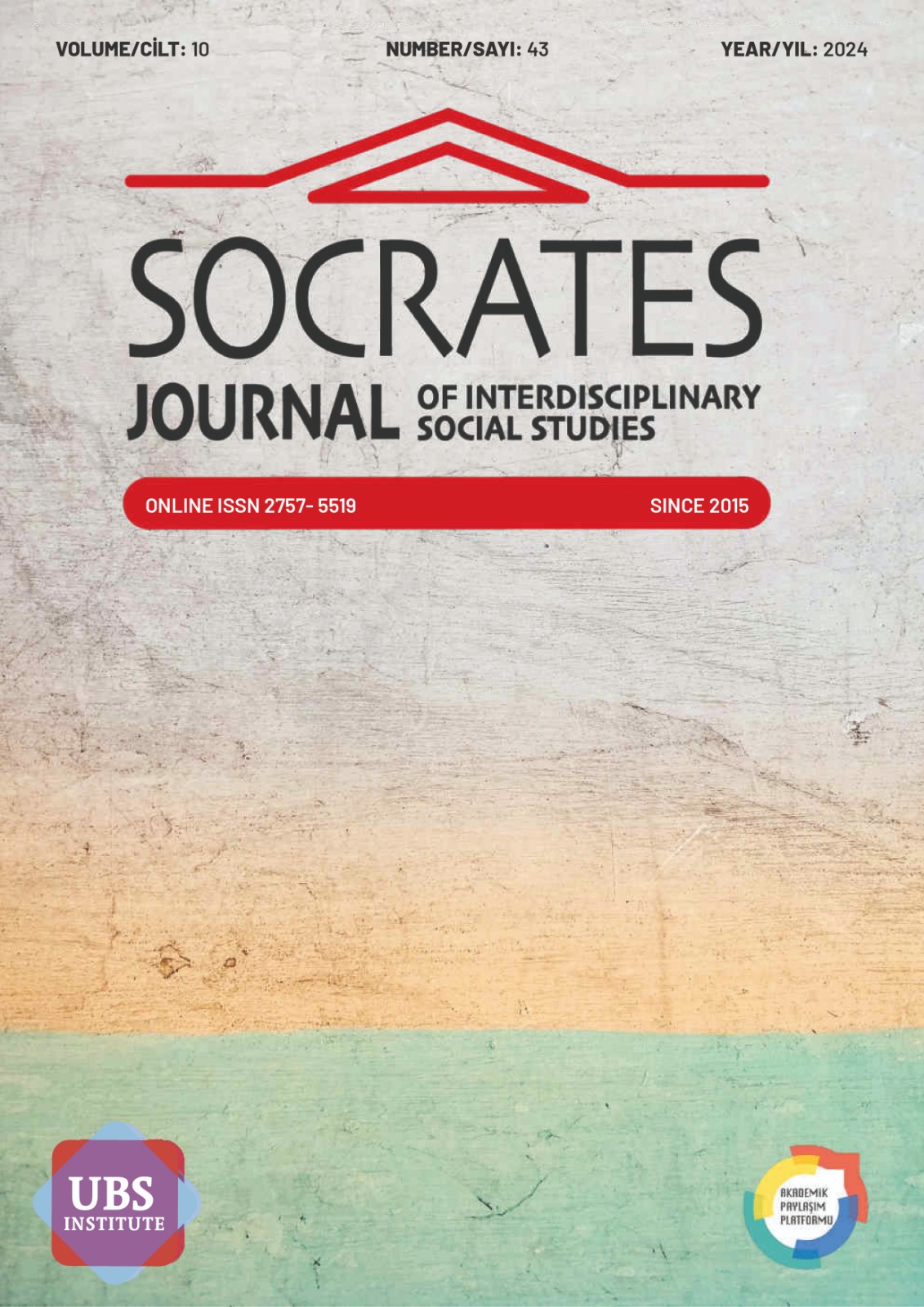ÖĞRETMEN ADAYLARININ BAKIŞ AÇISIYLA “ÖĞRETMEN ADAYI”
“TEACHER CANDIDATE” FROM THE PERSPECTIVE OF TEACHER CANDIDATES
DOI:
https://doi.org/10.5281/zenodo.12699440Abstract
Teacher training includes all activities carried out within a certain period of time in order to prepare for the teaching profession; The person who takes part in this training is called "Teacher candidate". The views of young people receiving teaching education on the expression "teacher candidate" and the meanings they attribute to the concept of "teacher candidate"; It can provide us with an idea about the internship process and professional perceptions. For this reason, the study aimed to examine the perceptions of social studies teacher candidates regarding the expression 'teacher candidate' through metaphors. Phenomenology, one of the qualitative research methods, was used in the research. In the 2021-2022 academic year, the study was conducted with 65 social studies teacher candidates who were studying in the fourth grade at Gazi University Gazi Faculty of Education and were selected through purposeful sampling. The sample group participating in the research was asked to complete a sentence such as "The teacher candidate is like ............... Because.....". In this way, participants were asked to establish a connection between the subject of the metaphor and the source. Content analysis method was used to analyze the research data. According to the research results; Social studies teacher candidates produced 36 metaphors in 5 categories regarding the expression 'teacher candidate'. 4 of these metaphors have negative meanings and 32 have positive meanings. Categories created from the metaphors obtained; It was named as "developing teacher candidate, shaping teacher candidate, struggling teacher candidate, goal-oriented teacher candidate and self-confident teacher candidate".
References
Afacan, Ö. (2011). Fen bilgisi öğretmen adaylarının “fen” ve “fen ve teknoloji öğretmeni” kavramlarına yönelik metafor durumları. Nwsa Education Sciences, 6(1), 1242-1254.
Arslan, S. ve Özpınar, İ. (2008). Öğretmen nitelikleri: İlköğretim programlarının beklentileri ve eğitim fakültelerinin kazandırdıkları. Necatibey Eğitim Fakültesi Elektronik Fen ve Matematik Eğitimi Dergisi, 2(1), 38-63
Azar, A. (2011). Türkiye’deki öğretmen eğitimi üzerine bir söylem: Nitelik mi, nicelik mi. Journal of Higher Education and Science, 1(1), 36-38.
Aykaç, N., Kabaran, H. , Bilgin, H. (2014). Türkiye’de ve bazı Avrupa birliği ülkelerindeki öğretmen yetiştirme uygulamalarının karşılaştırılmalı olarak incelenmesi (Almanya, Finlandiya, Fransa, İngiltere ve Türkiye Örneği). Turkish Studies-International Periodical For The Languages, Literature and History of Turkish or Turkic, 9(3), 279-292.
Creswell, J. W. (2014). Araştırma deseni. (Çev Ed.: S. B. Demir). Ankara: Eğiten Kitap.
Cohen, L., Manion, L., & Morrison, K. (2007). Research methods in education (6th ed.). New York: Routledge
Eraslan, A. (2009). İlköğretim matematik öğretmen adaylarının ‘Öğretmenlik uygulaması’ üzerine görüşleri. Necatibey Eğitim Fakültesi Elektronik Fen ve Matematik Eğitimi Dergisi, 3(1), 207-221.
Forceville, C. (2002). The identification of target and source in pictorial metaphors. Journal of Pragmatics, 34, 1-14.
Geçit, Y. ve Gençer, G. (2013). Sınıf öğretmenliği 1. sınıf öğrencilerinin coğrafya algılarının metafor yoluyla belirlenmesi (Rize Üniversitesi Örneği). Marmara Coğrafya Dergisi, (23), 1-19.
Kartal, T. ve Afacan, Ö. (2012). Pedagojik formasyon eğitimi alan öğretmen adaylarının öğretmenlik mesleğine ilişkin tutumlarının incelenmesi. Mehmet Akif Ersoy Üniversitesi Eğitim Fakültesi Dergisi, (24), 76-96.
Köse, A. (2016), Okul yöneticilerinin görüşlerine göre aday öğretmen yetiştirme sürecinin değerlendirilmesi, Abant İzzet Baysal Üniversitesi Eğitim Fakültesi Dergisi, 16(3), 924-944.
Lakoff, G., & Johnson, M. (2005). Metaforlar hayat, anlam ve dil. (Çev.: G. Y. Demir). İstanbul: Paradigma.
Morgan G. (1998). Yönetim ve örgüt teorilerinde metafor. (Çev.:, G. Bulut). İstanbul: BZD Yayıncılık.
Öğretmenlik Meslek Kanunu. (2022). https://www.mevzuat.gov.tr/mevzuat?MevzuatNo=7354&MevzuatTur=1&MevzuatTerti p=5
Saban, A. (2008). İlköğretim I. kademe öğretmen ve öğrencilerinin bilgi kavramına ilişkin sahip oldukları zihinsel imgeler. İlköğretim Online, 7(2), 421-455.
Seferoğlu, S. S. (2004). Öğretmen yeterlikleri ve mesleki gelişim, Bilim ve Aklın Aydınlığında Eğitim, 58, 40-45.
Semerci, Ç. (2007). Program geliştirme kavramına ilişkin metaforlarla yeni ilköğretim programlarına farklı bir bakış. Çukurova Üniversitesi Sosyal Bilimler Dergisi, 31(1), 139-154.
Sünkür-Çakmak, M. (2019). Öğretmen adaylarının öğretmenlik uygulaması derslerine ilişkin görüşleri. Siirt Üniversitesi Sosyal Bilimler Enstitüsü Dergisi, 7(13), 207-226.
Yıldırım, A. ve Simsek, H. (2005). Sosyal bilimlerde nitel araştırma yöntemleri. Ankara: Seçkin Yayınevi.
Yükseköğretim Kurulu. (1998). Aday Öğretmen Kılavuzu.
Zengin, S. ve Çoban, A. (2020). Sosyal bilgiler öğretmenliği bölümünde öğrenim gören öğretmen adaylarının uygulamalı eğitimde karşılaştıkları güçlükler. Türkiye Bilimsel Araştırmalar Dergisi, 5(2), 146-164.
Downloads
Published
How to Cite
Issue
Section
License
Copyright (c) 2024 Socrates Journal of Interdisciplinary Social Studies

This work is licensed under a Creative Commons Attribution 4.0 International License.


